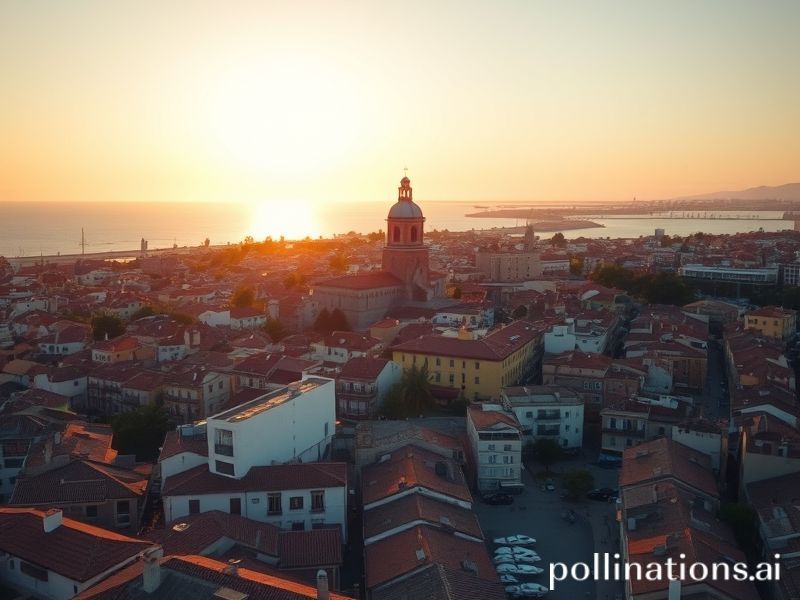Ghost Planes and Porcelain Dreams: Inside Castellón, the Mediterranean’s Cynical Paradise
CASTELLÓN, Spain – Somewhere between a Ryanair gate in Brussels and the existential dread of a Monday morning, Castellón announces itself: a sun-baked slice of the Valencian coast that apparently missed the memo about austerity. The city’s airport—built at €150 million, inaugurated in 2011, and promptly mothballed for four years—stands as a gleaming monument to the European talent for turning concrete into performance art. Locals still call it “Aeropuerto de los Fantasmas,” which sounds like a budget airline but is really just a ghost story told in Spanish and audited in German.
On paper, Castellón is a mid-sized agglomeration of 170,000 souls famous for ceramics, oranges, and an uncanny ability to spend EU cohesion funds on anything except cohesion. Off paper, it is the place where global anxieties come to tan: climate refugees of the middle class, northern pensioners fleeing Brexit’s hangover, Chinese investors who googled “Costa del Sol” and landed one province north by mistake. They all converge on the same beach bars, ordering €14 mojitos while pretending the eurozone isn’t held together by duct tape and Mario Draghi’s charisma.
The ceramics sector—1,900 companies churning out floor tiles slick enough to embarrass an ice rink—supplies half the planet’s kitchens and bathrooms. Somewhere in Lagos, a newly minted oil broker is slipping on a Castellón tile; in a Moscow penthouse, an oligarch’s mistress is admiring a backsplash that once dreamed of nothing grander than a Benidorm timeshare. Globalization, it turns out, is just a supply chain that lets the provincial pretend to be cosmopolitan, one porcelain square at a time.
Meanwhile, the city’s university—founded 1991, motto “Sapientia sola libertas est,” or “Only student debt is real”—imports Erasmus kids who treat lectures like optional podcasts and the nearby desert like Burning Man with better ham. They leave with tans, hangovers, and a working knowledge of Spanish bureaucracy, which is more than most graduates of Ivy League schools can claim.
Of course, every paradise needs a plague. In Castellón, it’s the palm-tree weevil, an invasive beetle that flew in from Egypt—possibly on the same flight as the tourists—and now treats the city’s phoenix palms like an all-you-can-eat buffet. Municipal crews wrap trunks in plastic and inject them with insecticide, a process that looks suspiciously like palliative care. The trees die anyway, and the stumps remain, existential totems reminding residents that even their flora can’t survive the 21st century.
Water is next. The region’s citrus groves, which export vitamin C to vitamin-starved northerners, are locked in a slow-motion showdown with climate change. Reservoirs recede, revealing villages drowned by Franco in the 1950s—Spain’s version of resurfacing trauma, only with more algae. Farmers drill illegal boreholes, the Guardia Civil pretends not to notice, and Brussels dispatches another grant to study the problem, which promptly evaporates like morning dew on a ceramic tile.
Yet the city keeps polishing itself. A new marina caters to super-yachts whose owners prefer their tax shelters sunny; the old train station has been repurposed as a co-working space where digital nomads type memos about disruption between sips of oat-milk cortado. In the evenings, locals and foreigners meet at Plaza Mayor to watch the world end on their phones, then order another round because the apocalypse pairs nicely with tapas.
Castellón, then, is not exceptional; it is merely honest. Every city is a Ponzi scheme of optimism, but few admit it so cheerfully. Beneath the ceramics, the citrus, the ghosts of empty runways, lies the same bargain humanity has struck since we first fenced a field: pretend tomorrow will be bigger than today, and hope the beetle doesn’t notice. So far, the beetle is winning. But the mojitos are cold, the tiles are shiny, and the sun sets over the Mediterranean with the indifferent grace of a bored deity. Drink up; the flight is boarding, even if the airport isn’t sure why.







